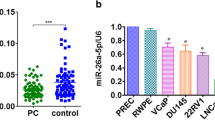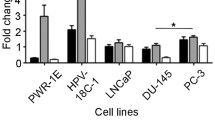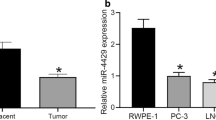Abstract
Objectives
Although studies have reported that miR-596 extensively participates in multiple cancer progression, the biological mechanisms and effects of miR-596 in prostatic cancer remain unclear. The literature is aimed to reveal the function and possible molecular mechanisms of miR-596 in prostatic cancer carcinogenesis.
Materials and methods
qRT-PCR was applied to examine miR-596 expression in prostatic cancer cell lines and samples, also methylation-specific PCR was used to detect the methylation status of the promoter CpG islands in prostatic cancer samples. Meanwhile, the tumor-related effects of miR-596 were detected via cell viability, clone formation assay, migration assay, flow cytometric and AO/EB assay. qRT-PCR and Western blots were applied to investigate the function of miR-596 on malignant behavior in prostatic cancer cells.
Results
We found that miR-596 mRNA was decreased in prostatic cancer samples and cell lines. miR-596 mRNA level was also correlated to cancer stage, Gleason scores, while miR-596 promoter methylation was related to cancer tumor stage, Gleason score and preoperative PSA levels. miR-596 inhibited the cell growth and activity by causing cell apoptosis, and also suppressed the migration of prostatic cancer cells by revealing the epithelial-mesenchymal transition process. In addition, Western blot indicates that miR-596 overexpression deregulated Wnt/β-catenin signaling, by restraining phosphorylation levels of β-catenin and expression levels of downstream targets.
Conclusions
In summary, this research indicates that miR-596 overexpression could be potentially useful in the cell growth and migration of prostatic cancer and serves as a potential molecular marker in prostatic cancer.






Similar content being viewed by others
References
Ghagane SC, Nerli RB, Hiremath MB, et al. Incidence of prostate cancer at a single tertiary care center in North Karnataka. Indian J Cancer. 2016;53:429–31.
Siegel RL, Miller KD, Jemal A. Cancer statistics, 2019. CA Cancer J Clin. 2018;68:7–30.
Basu S, Majumder S, Bhowal A, et al. A study of molecular signals deregulating mismatch repair genes in prostate cancer compared to benign prostatic hyperplasia. PLoS ONE. 2015;10:e0125560.
Zhao Y, Zhang G, Wei M, et al. The tumor-suppressing effects of QKI-5 in prostate cancer: a novel diagnostic and prognostic protein. Cancer Biol Ther. 2014;15:108–18.
Li S, Pu T, Xiao L, et al. Screening of recurrence related microrna in ductal carcinoma in situ and functional study of MicroRNA-654-5p. J Breast Cancer. 2019;22:52–66.
Li T, Zhou W, Li Y, Gan Y, et al. MiR-4524b-5p/WTX/β-catenin axis functions as a regulator of metastasis in cervical cancer. PLoS ONE. 2019;14:e0214822.
Ying L, Chen Q, Wang Y, et al. Upregulated MALAT-1 contributes to bladder cancer cell migration by inducing epithelial-to-mesenchymal transition. Mol Biosyst. 2012;8:2289–94.
Pereira DM, Rodrigues CMP. iRNAs as modulators of EGFR therapy in colorectal cancer. Adv Exp Med Biol. 2018;1110:133–47.
Liu SM, Lin CH, Lu J, et al. miR-596 modulates melanoma growth by regulating cell survival and death. J Invest Dermatol. 2018;138:911–21.
Li H. Exploration of alternative mechanism for MiR-596-mediated down-regulation of LGALS3BP in oral squamous cell carcinoma. Kokubyo Gakkai Zasshi. 2015;82:55–61.
Zhang Z, Dai DQ. MicroRNA-596 acts as a tumor suppressor in gastric cancer and is upregulated by promotor demethylation. World J Gastroenterol. 2019;25:1224–37.
Kim JH, Seo BS. How to calculate sample size and why. Clin Orthop Surg. 2013;5(3):235–42.
Vanz ALS, Renard G, Palma MS, et al. Human granulocyte colony stimulating factor (hG-CSF): cloning, overexpression, purification and characterization. Microb Cell Fact. 2008;7:13.
Shan Y, Ying R, Jia Z, et al. LINC00052 promotes gastric cancer cell proliferation and metastasis via activating the wnt/β-catenin signaling pathway. Oncol Res. 2017;25:1589–99.
Liu B, Chen W, Cao G, et al. MicroRNA-27b inhibits cell proliferation in oral squamous cell carcinoma by targeting FZD7 and Wnt signaling pathway. Arch Oral Biol. 2017;83:92–6.
Wang JJ, Li ZF, Li XJ, et al. Effects of microRNA-136 on melanoma cell proliferation, apoptosis, and epithelial-mesenchymal transition by targetting PMEL through the Wnt signaling pathway. Biosci Rep. 2017;37:BSR20170743.
Leighton X, Bera A, Eidelman O, et al. Tissue microarray analysis delineate potential prognostic role of Annexin A7 in prostate cancer progression. PLoS ONE. 2018;13:e0205837.
Nasser MI, Han T, Adlat S, et al. Inhibitory effects of Schisandrin B on human prostate cancer cells. Oncol Rep. 2019;41:677–85.
Ren W, Wang D, Li C, et al. Capn4 expression is modulated by microRNA-520b and exerts an oncogenic role in prostate cancer cells by promoting Wnt/β-catenin signaling. Biomed Pharmacother. 2018;8:467–75.
Zhao YS, Yang WC, Xin HW, et al. MiR-182-5p Knockdown Targeting PTEN Inhibits cell proliferation and invasion of breast cancer cells. Yonsei Med J. 2019;60:148–57.
Chen X, Wang A. Clinical significance of miR-195 in hepatocellular carcinoma and its biological function in tumor progression. Onco Targets Ther. 2019;12:527–34.
Zhang L, Zhang T, Deng Z, et al. MicroRNA-3653 inhibits the growth and metastasis of hepatocellular carcinoma by inhibiting ITGB1. Oncol Rep. 2019;41:1669–77.
Yao Y, Zhou Y, Fu X. miR-671-3p is downregulated in non-small cell lung cancer and inhibits cancer progression by directly targeting CCND2. Mol Med Rep. 2019;19:2407–12.
Wang B, Lu FY, Shi RH, et al. MiR-26b regulates 5-FU-resistance in human colorectal cancer via down-regulation of Pgp. Am J Cancer Res. 2018;8:2518–27.
Qu F, Cui X, Hong Y, et al. MicroRNA-185 suppresses proliferation, invasion, migration, and tumorigenicity of human prostate cancer cells through targeting androgen receptor. Mol Cell Biochem. 2013;377:121–30.
Thieu W, Tilki D, de Vere WR, et al. The role of microRNA in castration-resistant prostate cancer. Urol Oncol. 2014;32:517–23.
Li J, Yang X, Guan H, et al. Exosome-derived microRNAs contribute to prostate cancer chemoresistance. Int J Oncol. 2016;49:838–46.
Lin YL, Deng QK, Wang YH, et al. Aberrant protocadherin17 (PCDH17) methylation in serum is a potential predictor for recurrence of early-stage prostate cancer patients after radical prostatectomy. Med Sci Monit. 2015;21:3955–3690.
Lin YL, Wang YP, Li HZ, et al. Aberrant promoter methylation of PCDH17 (Protocadherin 17) in serum and its clinical significance in renal cell carcinoma. Med Sci Monit. 2017;23:3318–23.
Guo YL, Shan BE, Guo W, et al. Aberrant methylation of DACT1 and DACT2 are associated with tumor progression and poor prognosis in esophageal squamous cell carcinoma. J Biomed Sci. 2017;24:6–12.
Wang G, Chen H, Liu J. The long noncoding RNA LINC01207 promotes the proliferation of lung adenocarcinoma. Am J Cancer Res. 2015;5:3162–73.
Yin W, Chen J, Wang G, et al. MicroRNA-106b functions as an oncogene and regulates tumor viability and metastasis by targeting LARP4B in prostate cancer. Mol Med Rep. 2019;20:951–8.
Ou J, Guan D, Yang Y. Non-contact co-culture with human vascular endothelial cells promotes epithelial-to-mesenchymal transition of cervical cancer SiHa cells by activating the NOTCH1/LOX/SNAIL pathway. Cell Mol Biol Lett. 2019;24:39.
Chen T, Zhou L, Zhou Y, et al. HJURP promotes epithelial-to-mesenchymal transition via upregulating SPHK1 in hepatocellular carcinoma. Int J Biol Sci. 2019;15:1139–47.
Klos KS, Kim S, Alexander CM. Genotoxic exposure during juvenile growth of mammary gland depletes stem cell activity and inhibits Wnt signaling. PLoS ONE. 2012;7:e49902.
Ma K, Cao B, Guo M. The detective, prognostic, and predictive value of DNA methylation in human esophageal squamous cell carcinoma. Clin Epigenetics. 2016;8:43.
Wang D, Lu G, Shao Y, Xu D. MiR-182 promotes prostate cancer progression through activating Wnt/β-catenin signal pathway. Biomed Pharmacother. 2018;99:334–9.
Yu Z, Wang Z, Li F, et al. miR-138 modulates prostate cancer cell invasion and migration via Wnt/β-catenin pathway. Mol Med Rep. 2018;17:3140–5.
Zhang K, Guo Y, Wang X, et al. WNT/β-catenin directs self-renewal symmetric cell division of hTERThigh prostate cancer stem cells. Cancer Res. 2017;77:2534–47.
Funding
Key projects of Chongqing Health Commission, 2016ZDXM031 and Chongqing Health Committee, 2020MSXM015.
Author information
Authors and Affiliations
Corresponding author
Ethics declarations
Conflict of interest
The authors declare that they have no competing interests.
Ethical approval
All procedures performed in studies involving human participants were in accordance with the ethical standards of the institutional and/or national research committee and with the 1964 Helsinki Declaration and its later amendments or comparable ethical standards.
Informed consent
Informed consent was obtained from all individual participants included in the study.
Additional information
Publisher's Note
Springer Nature remains neutral with regard to jurisdictional claims in published maps and institutional affiliations.
Rights and permissions
About this article
Cite this article
Dai, J., Yuan, G., Li, Y. et al. MicroRNA-596 is epigenetically inactivated and suppresses prostatic cancer cell growth and migration via regulating Wnt/β-catenin signaling. Clin Transl Oncol 23, 1394–1404 (2021). https://doi.org/10.1007/s12094-020-02536-y
Received:
Accepted:
Published:
Issue Date:
DOI: https://doi.org/10.1007/s12094-020-02536-y




